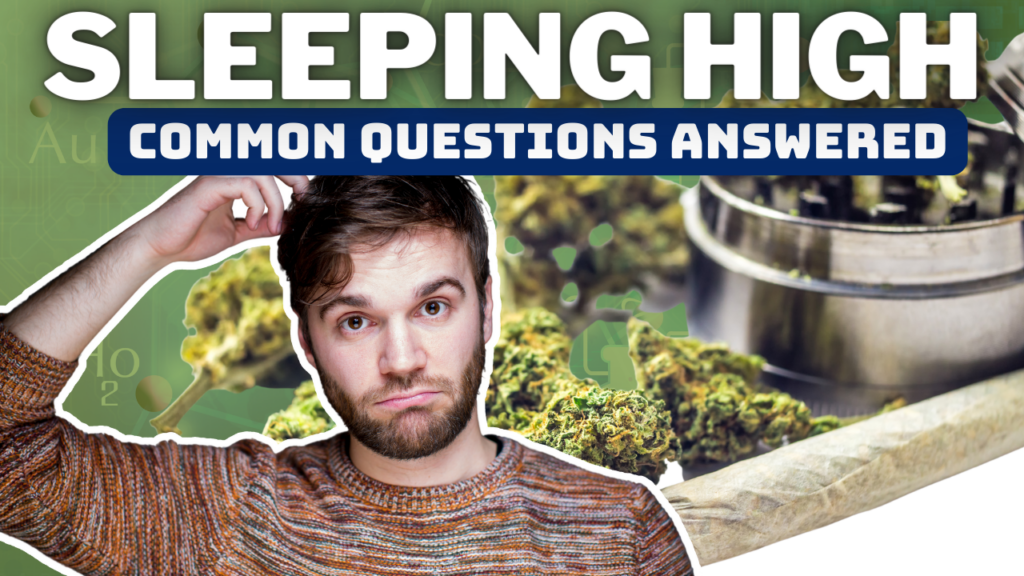What Happens When You Sleep High? (Positives & Negatives)
If you have heard about utilizing marijuana to help you sleep, you’re not alone. A report published by the Canadian Pharmacists Journal shows that cannabis may help patients suffering from insomnia and other sleep disorders.

As more states legalize recreational cannabis, more people are self-medicating with marijuana to help them sleep better. Some smoke or take concentrate before bed, while others eat gummies. But what exactly happens within the body and mind when you sleep high? Are you still getting the same quality sleep?
Below, we’ll look at the effects of sleeping high on your body and brain, and examine the crucial question of whether weed really does help you get better sleep. That way, you know what happens when you sleep high and can make an informed decision for whether its right for you.
What Happens When You Sleep High?
Marijuana can have many potential effects on sleep. It may help you fall asleep faster but shortens your REM cycle, which may impact memory. It helps treat nightmares, but prolonged use can cause other health problems for your body.
Let’s look more closely at what happens when you sleep high to your brain and sleep cycles, body, and other factors.
How Getting High Affects Your Sleep
Getting high helps many people with some of the most challenging aspects of sleep, but it’s not all positive news.
It Helps You Fall Asleep Faster
First, both research and anecdotal evidence point to the fact that marijuana helps some people fall asleep faster. It’s a natural depressant, which means it slows your body systems down. Other side effects of using marijuana can help people fall asleep, too.
For many users, weed makes them feel calmer and more relaxed. Since stress is a common cause of restlessness at bedtime, weed might help. It’s critical to note that some people experience the opposite. Instead of calming down, marijuana makes them more alert and nervous, even paranoid.
Falling asleep faster also increases the likelihood of passing through the earliest sleep phases more quickly. That isn’t necessarily a bad thing. But prolonged use can disrupt your body’s ability to fall asleep and pass through these phases naturally.
It Restructures Your Sleep Cycles
One of the most dramatic ways that sleeping high affects you is the way it restructures your sleep cycles. Humans are wired to go through distinct phases of sleep, from dozing, to light sleep, deep sleep, and finally, REM sleep.
Research suggests that marijuana either shortens or eliminates the time you spend in REM sleep (more on that below). Instead, you spend more time in the phase just before it.
The phase before REM sleep is one of the deepest we experience. Spending extra time in it is a good thing. But rest is also about resetting our bodies, which do different tasks in each phase. That means your body has less time to do its other jobs, some of which suffer.
Spending more time deeply asleep may help explain the groggy feeling you get when you wake up after being high.
It Vastly Reduces REM Sleep
REM sleep is the last phase of sleep that we enter before waking. While it isn’t as restful as some others, important things happen here. If you routinely use marijuana to sleep, you may notice detrimental effects in this area.
During REM sleep, your brain gets busy processing recent events, making new memories, and even new pathways. It’s also when your brain “resets” emotionally, helping you work through your unprocessed feelings before waking up and starting a new day.
Scientists have proven that weed affects your memory since it acts on the same part of the brain. However, we know less about prolonged marijuana use and how it might affect memories.
Some experiments on animals indicate that prolonged marijuana use can affect the hippocampus, a part of the brain crucial for memory.
Marijuana may also disrupt REM sleep permanently. If you try to stop using marijuana for rest or if your dosage becomes too low, you may be unable to enter REM sleep and wake up too early. However, your body will likely readjust and return to normal over time.
There can be good news about skipping REM sleep since it’s also where dreaming happens. Some people might be dismayed that they may not dream when they sleep high. But for others, especially those with night terrors or PTSD, it can be a lifesaver.
In addition, some neurological conditions get worse during REM sleep and cause sufferers to awaken early. One of the most notable is restless leg syndrome. Going to sleep high can calm involuntary movements.
The Effects of Sleeping High on Your Body
Anything that affects your ability to sleep or your sleep cycles will have an impact on your body. Just as your brain uses each sleep phase for something different, so does your body.
Since marijuana can drop you into a deep sleep quickly, that sometimes doesn’t give your body’s systems–especially the digestive system–time to catch up. Over time, that lack of homeostasis can cause issues with your metabolism.
You should also consider the overall effects of using marijuana on your body. While the medical field needs to do more research, regular marijuana use might cause issues with athletic performance, increased suicidality, and premature birth.
Specifically relevant to getting a good night’s sleep, if you choose to smoke weed rather than eat edibles, it can irritate your throat and lungs. You may even awaken to coughing fits after prolonged use.
Conversely, for people who use marijuana for sleep successfully, the benefits of getting regular quality sleep outweigh the costs. Be vigilant about cognitive issues (memory and emotion regulation especially) since those appear more gradually.
Other Side Effects of Going to Bed High
You should consider other things when deciding whether to go to bed high.
First, does using marijuana–which is a controlled substance and illegal at the federal level–align with your personal values? If using it will cause you to feel shame or violate your community’s belief system, the extra sleep might not be worth it.
Marijuana should also fit into your lifestyle. If you live with your family or in an apartment, you may be unable to light up. If you have young children who wake up during the night, even occasionally, you probably don’t want to be high for that.
Consider what being high might do to your sex life, too. It enhances it for some people, but it has a detrimental impact on many. That can cause issues in your entire relationship and might not be worth it.
Finally, if you’re subject to drug tests at work, find out how your employer feels about the legal use of marijuana and how they handle positive test results when that’s the case.
Is Marijuana Safer Than Other Sleep Aids?
Once again, there isn’t enough research to say definitively that cannabis is safe or dangerous for long-term use. However, we know some of the side effects of common sleep aids.
For prescription sleep medications, one of the most concerning side effects is dependency. Once you start using many of these drugs, you may have difficulty stopping. This includes several of the most popular ones, including Lunesta, Sonata, and Ambien.
Marijuana can also lead to dependency, but not a chemical dependency. Some people also feel more comfortable with marijuana dependency because it’s a natural substance, while most medications are synthetic.
Some of the other common side effects of prescription medication are also similar to those of marijuana, including:
- Drowsiness
- Lightheadedness
- Headache
- Fatigue
- Changes in thinking or behavior
Can Marijuana Help You Sleep?
The answer is–it depends on who you ask. There are peer-reviewed studies published on both sides of the aisle.
That means solid evidence exists that weed helps you sleep, but it also might cause other sleep-related problems. And again, an overall lack of research makes answering the question even more complicated.
Most people who have smoked marijuana in the past acknowledge that it makes you tired. It also causes some people to feel calm and relaxed. Those effects can help many overcome common sleep barriers, including stress, anxiety, tenseness, and racing thoughts.
However, over-consumption and even dependence can become issues. Interestingly, the positive effects of marijuana on sleep go down when you use it more.
The more weed you consume, the worse your sleep gets. That’s a problem with relying on weed for sleep long-term. Your body builds tolerance, and you need more to get the same effects. It’s also a problem if you use the drug recreationally during the day.
As with any medication, it’s crucial to go into the process with an open mind. You should also be well-informed and strive to be as objective as possible.
Tips for Using Cannabis for Sleep
We want to share a few helpful tips if you decide to give weed a try.
Buy and Use Legally
Always ensure that you follow the law when you use or carry marijuana. Be aware of all laws governing the use of marijuana in your location.
You should only buy weed from a licensed dispensary in the state where you plan to use it. Even in states that have legalized recreational marijuana, selling it without a license is still illegal.
Even if you use weed for medicinal purposes (such as sleep), it’s recreational unless you have a prescription. You can get a prescription for sleep disturbances in many US states. It will expand the area in which you’re allowed to use it.
Know Your Strains
Not all strains of weed are good for sleep! Some will have the opposite effect that you want. In general, indica strains tend to work better for rest. If you don’t know much about weed, ask the “bud-tender” at the dispensary for their advice.
Try Edibles and Start Slow
There’s painfully little reliable research on how best to use marijuana for sleep. The issue with smoking before bed is that the effects wear off too quickly. Smoking also causes coughing and inflammation.
Conversely, you could wake up groggy (and a little high) with edibles. Still, edibles may be preferable, especially if you can get the dosage right. Start with just a couple of milligrams and work your way up until you find the right balance.
Frequently Asked Questions about Weed and Sleep
Before we go, let’s address some common questions people have about marijuana and sleep that we haven’t already.
Is sleep considered a medicinal use for marijuana?
The medical community considers it medicinal, yes. However, each state has set its guidelines for issuing medical marijuana cards. Talk to your physician or visit a clinic to learn more.
Can you wake up still high in the morning?
If you smoke before bed, almost certainly not. But if you take edibles, it’s a possibility. That’s why we recommend starting slow with three milligrams or less of THC. Once you figure out your correct dosage, you no longer have to worry about it.
How long before bed should you use weed?
That will also be a learning process for you. It takes about fifteen minutes to feel the full effects when you smoke. If you want to smoke before bed to help you relax and fall asleep faster, you can start up to an hour before bedtime.
Edibles hit slower, but the exact length depends on your body’s digestive process, how much food is already in your stomach, and other factors.
Edibles are better for helping you stay asleep or go back to sleep if you awaken during the night rather than falling asleep. For that reason, most people who use them eat them right before bed.
Should You Try Marijuana for Sleep?
Many people find occasional marijuana use for sleep very beneficial. It helps you fall asleep and can give you a more restful night. At the same time, overuse can cause other sleep problems, and it’s crucial to be aware of the different ways weed affects your body.
However, it’s an individual choice that only you can make for yourself. Consider the information here, and discuss it with your healthcare provider. Either way, you have what you need to make the best decision!




